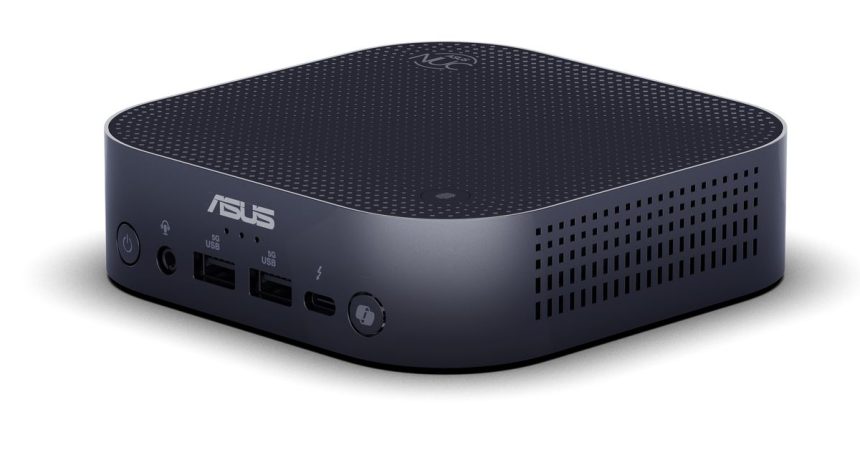The anticipation surrounding Microsoft’s Arm-based Copilot Plus features transitioning from laptops to desktop PCs is finally culminating. Initially launched in June, Copilot Plus offers features like Recall, Click To Do, and AI-powered image manipulation. Now, six months later, mini PCs are emerging with the necessary AI processing power (measured in TOPS, or Tera Operations Per Second) to support these capabilities, potentially positioning Microsoft to compete more effectively with Apple’s Mac Mini. Asus has taken the lead, announcing the NUC 14 Pro AI, a mini PC nearly identical in size to the Mac Mini and featuring a dedicated Copilot button. This prominent placement of the Copilot button suggests strong collaboration between Asus and Microsoft, hinting at a broader initiative to integrate Copilot more deeply into the PC experience.
The emergence of Copilot Plus-ready mini PCs aligns with increasing activity in the mini PC market. Alongside Asus’s announcement, Geekom unveiled three new mini PCs. Notably, two of these models, one based on AMD’s Strix Point CPUs and another powered by Qualcomm’s Snapdragon X Elite processor, boast Copilot Plus compatibility. The presence of Qualcomm’s latest chips in these mini PCs marks their first foray beyond laptops, following the cancellation of Qualcomm’s Snapdragon Dev Kit for mini PCs. This expansion suggests a growing ecosystem for Arm-based Windows devices and raises the possibility of Copilot Plus integration into all-in-one PCs in the near future. The Consumer Electronics Show (CES) is expected to reveal further developments from other Windows OEMs regarding their Copilot Plus strategies.
The focus on mini PCs for Copilot Plus functionality stems from the current limitations of desktop CPUs. While Intel’s latest Core Ultra desktop CPU includes an NPU, it falls short of Microsoft’s 40 TOPS requirement for Copilot Plus. Until next-generation desktop CPUs from Intel and AMD arrive with more powerful NPUs, mini PCs and all-in-one PCs leveraging laptop processors will remain the primary avenue for experiencing Copilot Plus on desktop-style devices. This hardware limitation underscores the demanding computational requirements of advanced AI features.
While Copilot Plus remains exclusive to Windows PCs, Microsoft’s broader ambition for its AI assistant extends far beyond traditional computing platforms. Sources suggest the company aims to embed Copilot in a wider range of devices, hinting at potential integrations with wearables and other unexpected hardware. Microsoft has been increasingly vocal about its interest in dedicated AI hardware, potentially paving the way for innovative devices specifically designed to leverage AI capabilities. These aspirations are further reinforced by comments from Microsoft executives about the future of AI-powered wearable devices, particularly in the health and fitness sectors. This suggests a potential resurgence of Microsoft’s interest in the wearables market, possibly through partnerships with device manufacturers rather than developing its own hardware.
2024 has been a significant year for Windows on Arm, largely driven by the introduction of Copilot Plus PCs. These devices have showcased notable advancements in performance, compatibility, and battery life, solidifying the viability of Arm-based Windows laptops for everyday use. However, the Windows ecosystem is not without its challenges. A recent bug affecting Windows 11 has prevented some users from installing security updates, particularly those who manually installed the OS using USB installers created with specific release patches. Microsoft is working on a permanent solution, but the current workaround requires a full rebuild, potentially causing disruption for businesses.
Beyond the desktop, Microsoft is actively involved in the evolving landscape of handheld gaming. Lenovo’s upcoming “future of gaming handhelds” event at CES, featuring representatives from both Valve and Microsoft, suggests a potential convergence of interests in this rapidly growing market. The presence of Jason Ronald, Microsoft’s VP of next generation, further fuels speculation about Microsoft’s next-gen Xbox plans and the company’s potential involvement in handheld gaming devices. Meanwhile, Microsoft continues to expand the accessibility of its AI coding tools. GitHub, now owned by Microsoft, is offering a free tier of GitHub Copilot in VS Code, providing developers with access to AI-powered code completion and assistance, utilizing models from both Anthropic and OpenAI. This move democratizes access to powerful coding tools and reflects Microsoft’s broader strategy to integrate AI throughout its developer ecosystem. Additionally, Microsoft is reportedly exploring the integration of third-party AI models into its Microsoft 365 Copilot, aiming to reduce costs and diversify its AI capabilities beyond its reliance on OpenAI. This could involve incorporating Microsoft’s own AI models or those from other providers like Anthropic and Google.



